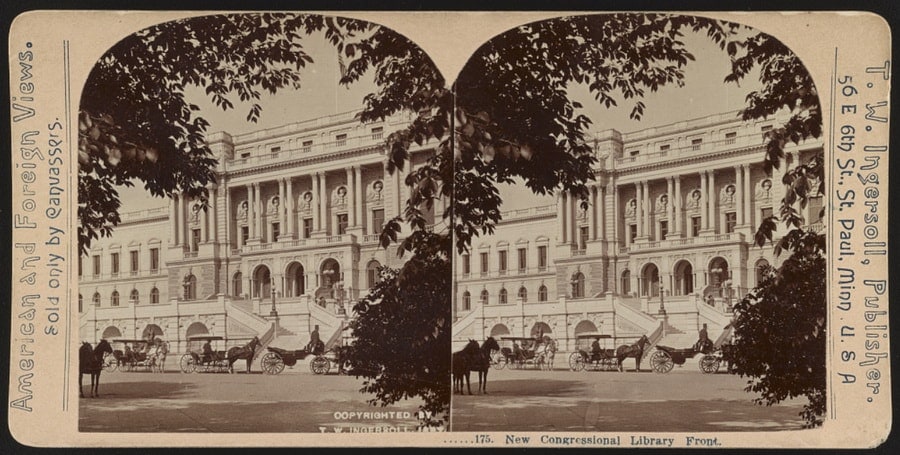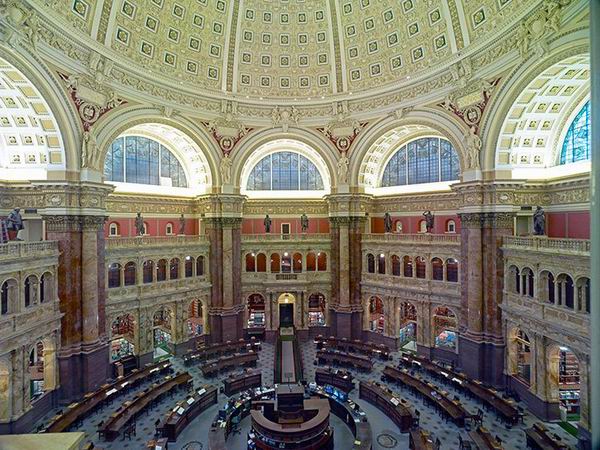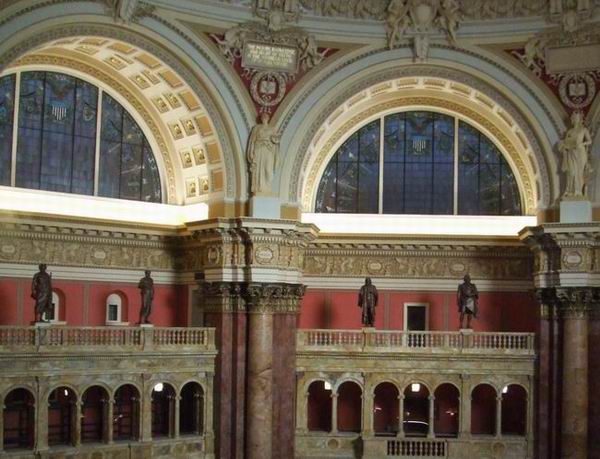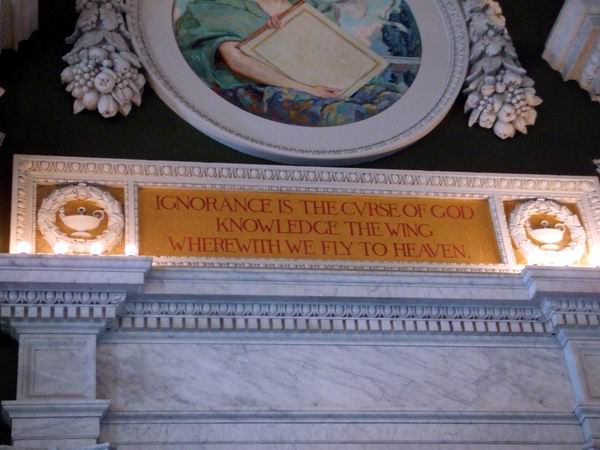I had a pretty full weekend — I’m writing this while sitting in the airport, waiting for my plane to get me the rest of the way home. I had a very interesting trip to Washington D.C.; election time makes the town even more surreal than usual. My report next week will get into that a little bit more.
When I worked at the Jet Propulsion Laboratory, I got to The District fairly often — meetings, status reports, getting direction, etc. from NASA headquarters.
Taking Advantage
In my off hours I’d head for the Capitol Mall nearby, working my way from one sightseeing spot to the next. (Well, sort of: I’d do the National Air & Space Museum, and then, oh, the National Portrait Gallery. Then the next trip I’d go to the National Air & Space Museum, and then the Arlington National Cemetery. Then the next trip I’d go to the National Air & Space Museum, and… well, you get the pattern.)
One place I never visited: the Library of Congress.
As a writer, I make my living in part due to copyrights. A lot of people don’t quite understand the concept, so here it is in a nutshell: copyright is in place, specifically included in the U.S. Constitution*, to give the authors of creative works the exclusive right to decide who gets to make copies (publish) their work so that we’ll be encouraged to create them in the first place for the good of humanity. (Yep: even tabloids. But stay with me.) So a copyright is literally a legal right to copy, and is most decidedly not a “copywrite” (as many people spell it).
*(Obviously, the U.S. isn’t the only country that has a copyright law, and we didn’t come up with the idea.)

Massive Collection
In the U.S., it’s the Library of Congress that administers copyright: to get a copyright one not only has to fill out a form and pay a fee (ah, government!), but also send a couple of copies of the work at the same time. If it’s considered “important,” it’s kept by the Library of Congress, which has 650+ miles of shelves for its collection.
And that doesn’t include the items they digitize (or, in the past, microfilmed). Because copies of each work are required, the LOC gets around 22,000 submissions per day, of which it keeps about half.
It is the biggest library (as far as holdings) in the world — more than 138 million items. They even have the largest collection of comic books in the world (100,000+).
(NOTE: As I said, that was a “nutshell” discussion of copyright. As such, it’s obviously not exhaustive! For general concepts, this article is quite good. For more on U.S.-specific law, see this article. For how countries cooperate with each other on copyrights, see this article on the Berne Convention. Yes, something is “copyrighted” immediately upon creation, but to get any legal protection, it indeed must be registered. But again, that’s outside the scope of a “nutshell” description of the basics.)
Open to the Public
The public can’t “check books out,” but “just anyone” can go there and view items in the collection in the gorgeous reading room.
They’re working on putting a lot of their holdings on the web, too, so that anyone in the world can use their materials. And, of course, the LOC is the research library for Congress, so any senator or representative can call to say “I need books and articles about X” — and supposedly get them within the hour, even though it’s a myth that the LOC has a copy of “every book ever printed.”
Tourists don’t see much of that, though we can peek into the reading room, and it’s awe-inspiring. (To get in, you have to register as a user.)

The library is housed in three huge buildings, but the main attraction is the Thomas Jefferson Building, which was completed in 1897 ($150,000 under budget, just about everyone in Washington is proud to say. Yeah, well, the total budget was more than $6 million, which in that era was quite a tidy sum!)
But indeed it does earn its reputation as “the most beautiful public building in Washington” — and yes, that includes the White House. It is spectacular from floor to ceiling.

Above each doorway and window is a saying. Our politicians would be well advised to go read them carefully.
“There’s only one good namely knowledge / And only one evil namely ignorance.” (No, there’s no punctuation; I’m putting in slashes for clarity….)
“Science is organized knowledge”.
Or how about, “Wisdom is the principal thing / therefore get wisdom and with all thy getting get understanding”.

It is fitting that the “most beautiful public building” in our capital is the Library of Congress, the public institution that helps make artistic professions work. It figures that so many ignore its lessons, and it was about time that I finally visited.

Next week: my visit to a much more famous building….
– – –
Bad link? Broken image? Other problem on this page? Use the Help button lower right, and thanks.
This page is an example of my style of “Thought-Provoking Entertainment”. This is True is an email newsletter that uses “weird news” as a vehicle to explore the human condition in an entertaining way. If that sounds good, click here to open a subscribe form.
To really support This is True, you’re invited to sign up for a subscription to the much-expanded “Premium” edition:
Q: Why would I want to pay more than the minimum rate?
A: To support the publication to help it thrive and stay online: this kind of support means less future need for price increases (and smaller increases when they do happen), which enables more people to upgrade. This option was requested by existing Premium subscribers.

The photo of the reading room reminds me of a scene from “All the President’s Men” where Woodward & Bernstein are reviewing all their required requests for material one at a time by hand. The camera is overhead as it pulls up and up and up…..
It is truly an (you said it) awe-inspiring shot.
Wonderful pics. My niece & husband live in D.C. (he just passed the VA Bar! YAY!) I’m hoping to go out and visit in a year or two……have to stay at least a week just to see all the museums! I hate to admit, but I probably would have chosen to bypass the Library of Congress, but now I think it’d have to be on my ‘to do’ list. Ever grateful for the inspiration.
It’s my understanding that since the 1970s, in accordance with a treaty, anything written is automatically copyrighted. What you get for registering by sending copies to the LOC is the ability to sue for statutory damages, up to $150,000 per infraction, not just actual damages, which take more legal effort to determine rather than simply count the infractions and multiply.
But IANAL.
—
You cannot sue for copyright infringement unless the copyright is registered. -rc
Randy is right but I believe that the copyright can be registered after the fact – you just won’t be eligible for the 150k$ penalty hammer.
—
Exactly. The point wasn’t to do an exhaustive treatise on copyright — it was just a “in a nutshell” summary. There are plenty of good places to read up about copyright if you’re interested; I’ll find a couple and link to them in the main text. -rc
I had always understood that the British Library was the biggest in the world based on numbers of items held – 150 million items (that’s all printed items, not just books) as opposed to the 138 million you state are housed by the Library of Congress.
I suspect the Library of Congress might be larger on the basis of size or shelf-length.
—
If so, then we both have something to be proud of! I may have remembered wrong; I’ll check up on that. -rc
Out of interest, do you have to submit copies of your each and every bit of your electronic work to the LOC? I’d vaguely assumed that such short pieces didn’t have that requirement, but I’ve just noticed your comment about the need to register works in order to sue for infringement…
On a more pedantic note, don’t you think “I make my living in part due to copyrights” is a bit mild? Aren’t they absolutely essential in order to enable you to earn from your profession?
—
One can submit copies electronically, too. But no, I don’t think my statement is mild; I could do it without copyright, but it helps to have the force of law behind me when I ask people to stop ripping me off. -rc
About 6 or 8 years ago I went with a friend to the LOC to research music from the 1830’s (he’s a musician). Most of the music is kept in one of the other buildings, but there were a couple books that we had to go to the Main Reading Room to get. You put in your request at the main desk in the center of the room, then go sit down at one of the desks around the room. Eventually, they bring you the book(s) you requested.
It was my first and (so far) last visit to the LOC, but I’m glad I had the opportunity. And I still have my LOC library card!
I also recently visited the LoC for the first time in my many visits to DC. And wow, what a building. Thanks for sharing the story.
Neil: The US copyright office has this to say. Summary is that you don’t have to register copyright, but if you do so at time of creation, you’ll have an easier time in court should it ever come to that.
When is my work protected?
Your work is under copyright protection the moment it is created and fixed in a tangible form that it is perceptible either directly or with the aid of a machine or device.
Do I have to register with your office to be protected?
No. In general, registration is voluntary. Copyright exists from the moment the work is created. You will have to register, however, if you wish to bring a lawsuit for infringement of a U.S. work.
Why should I register my work if copyright protection is automatic?
Registration is recommended for a number of reasons. Many choose to register their works because they wish to have the facts of their copyright on the public record and have a certificate of registration. Registered works may be eligible for statutory damages and attorney’s fees in successful litigation. Finally, if registration occurs within 5 years of publication, it is considered prima facie evidence in a court of law
Like Randy, I’m a copyright creator – but based in the UK, so I’m aware of some of the areas in which US copyright law differs from elsewhere.
Felix is pretty much right – most major countries (including the US, since 1989) now follow the Berne Convention for the Protection of Literary and Artistic Works, which means that works are protected by copyright whether or not they have a copyright notice, and whether or not they are registered with the US Copyright office.
Because of the Berne Convention, US law also protects copyrighted work created in other countries that signed that treaty – and it’s only works of US origin that *must* be registered with the US Copyright Office before an infringement suit can be filed in court. (The UK does not have an equivalent registration process, by the way.)
For US copyright legislation, there’s a pretty good FAQ online at http://www.copyright.gov, if anyone fancies more reading on the topic!
Definitely – the LOC is one of my favorite places. My pattern followed yours when I employed at the Navy Air Station Alameda.
A nit picking comment – “In the U.S., it’s the Library of Congress that administers copyright: to get a copyright one not only has to fill out a form and pay a fee (ah, government!), but also send a couple of copies of the work at the same time.”
The fees are for maintaining gov services. I’m a Computer teacher, students (former or present) think I should be available to them because they pay their taxes. Many times, I feel like I’m the doctor at dinner.
But then again – I’m sure you are subjected to the same by ‘free’ subscribers like me.
Thank you for your quick copyright lesson. The “copyright” vs. “copywrite” misunderstanding is, at times, the bane of my existence. You see, I am a copywriter. Many times when I tell people this, they assume that I grant copyrights or enforce them — something of that nature. They seem very impressed with what they think is some sort of legal expertise. When I explain to them that I actually write marketing and advertising copy, they always do that dog-with-its-head-cocked-sidways thing. So, I decided to just start introducing myself as a “writer.” However, now they say, “Really? What kind of novels do you write?” I can’t win.
On a related matter you may well already know, I found out a few years ago that one thing I can do is to put my entire website on send it on a CD — or maybe I have to send two copies, I forget — but haved to pay only a single copyright fee.
Never been to the LOC myself, but the pictures sure are nice. Glad you had a good trip.